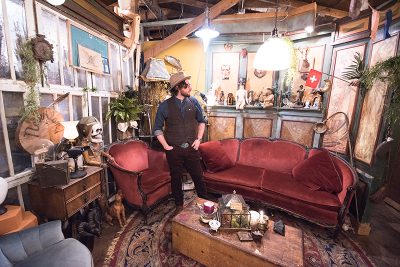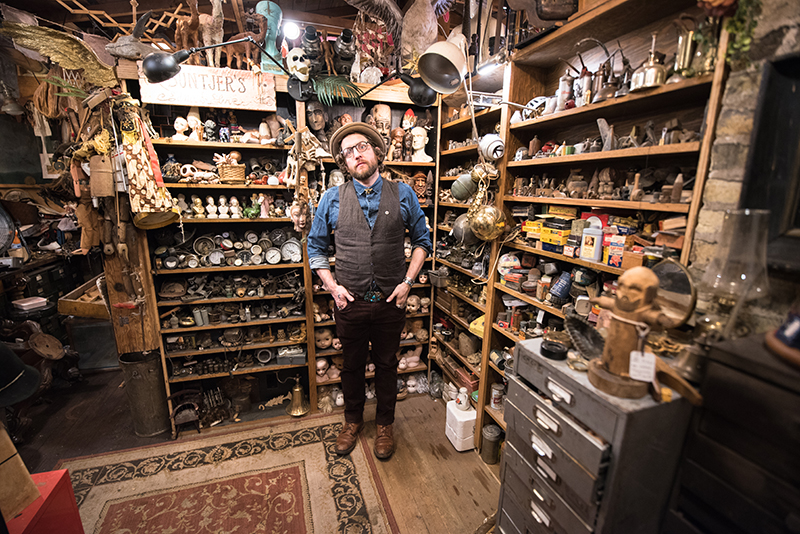Designing New Worlds: Jake Buntjer
Art
There’s a fine line between escapism and a clever reimagining of our current reality. Under the moniker Mister Pauper, Provo-based artist Jake Buntjer has taken his lifelong love for tinkering and world-building to massive proportions in both his creative and professional life. Buntjer’s design work is rooted in the idea of “experiential design.” Rather than appeal to a purely visual 2-D or 3-D aesthetic, he emphasizes the creation of lived-in spaces that connect with his audience on a more tactile level. Far from a viewer engaging with his art through passive reflection and contemplation, Buntjer hopes to draw people into his self-constructed worlds as a means of sparking compassion and togetherness in Utah’s arts communities.
Part of these worlds’ unifying effects is rooted in their strangeness. “I don’t try to create periods of time—I don’t try to create the 1920s or the future,” Buntjer says. “I try to create alternatives, things that exist somewhere in between all of those different things. It makes the worlds I create very eclectic but with a purpose.” The result is an instantly recognizable style, something of a cross between the nostalgic, mystical woodlands atmosphere of Maurice Sendak’s Where the Wild Things Are and the surreal excess of Fellini’s La Dolce Vita. Still, like these works of art, Buntjer doesn’t fully retreat from the ills of modern life. Instead, he uses his fantastical elements as a means of processing distress. “What I do with my art is create opportunities for real understanding and shifts in narrative, not destruction of narrative,” he says.
In just a few short years, Mister Pauper has turned from a solo art project to a full-fledged business. Along with his primary collaborator, Jerid Hollywood (Hensley)—a former construction worker who turned away from lucrative house-building in order to exercise his creative muscles—the pair has brought its skills to a breadth of Utah-based events and spaces. Their past projects range from a promotional campaign for Honest John Bitters Co. to a permanent installation at The Rest, from booths at the Utah Arts Festival and the Craft Lake City DIY Festival to private corporate holiday parties. The duo (as well as an ever-rotating list of other collaborators) thrive on the sheer uniqueness of their work in these design spaces. “That’s our job, to really blow fucking minds,” says Buntjer. “[The attendees] can be wowed and find something in themselves.”
Jake Buntjer describes his work as a “whimsical nightmare.”

While the pair notes an initial uphill battle in trying to get clients on board with their unique approach to event design (“When people create budgets, oftentimes, it’s really easy to pass over why you need the vibe and feel and the environment,” says Buntjer), their commitment to excellence has steadily accumulated a hard-earned reputation. “People don’t understand this in their budget until they go to one of our events,” says Hensley. “They saw the corporate party last year, and it was in a boring room with bright lights and undecorated picnic tables. Then they come into one of our worlds, and they’re blown away and find themselves comfortable quickly.”
At the heart of this comfort is also an inherent eeriness that defines the Mister Pauper style. Buntjer describes his work as a “whimsical nightmare,” a quality reflected in the Lewis Carroll–esque hodgepodge of reconstructed antiques and repurposed found objects that frequently mark his creations.
“Taken out of context, I’m a hoarder,” Buntjer says jokingly. “It’s my crazy that we’re all scared to show people. I’m learning how to own my crazy.” Hensley adds that, far from their combined idiosyncratic qualities leading to mutual destruction, “Our crazies mesh up and make something bigger. We fill in the gaps.”
“Right now, I feel really comfortable being crazy.”
It’s exactly this excess of perceived nonconformity that drives everything Buntjer and Hensley do together. “It’s super symbiotic, and it’s egoless—which, in the art world, is impossible,” says Buntjer. “Right now, I feel really comfortable being crazy, attracting other people who are doing their crazy and making our crazy better.” The hub of this collaborative spirit is Provo’s Boxcar Studios, a carnival funhouse of artistic spaces founded by Buntjer—studio spaces, a stage, a coffee house. During our interview, artists and musicians come and go, birds are chirping away and potential tenants are touring the spaces while a live act soundchecks for an upcoming show. Boxcar presents itself as a real representation of the insular utopia Buntjer and Hensley strive for in all of their Mister Pauper work.
As Buntjer and Hensley move forward, both with Boxcar and their event work, they hope to continue opening new doors for Utah’s art community and using their designs to open up beneficial and sympathetic discussions. “I think art or creativity is not a weapon,” says Buntjer. “[I want to] create a narrative that allows people to leave what they once believed as concrete truth, enter somewhere that’s nonthreatening and stand next to someone who they would never get the chance to stand next to or talk to. In this world, they can exist together and they can find a purpose to understand. That’s true art to me.” Find photos of Mister Pauper’s work, as well as information on The Boxcar Studios and other upcoming events, on Buntjer’s website misterpauper.com.
More on SLUGMag.com:
Dark Arts Gallery III: SLC’s Finest and Grimmest
Artist Céline Downen: For the Love of the Litter
